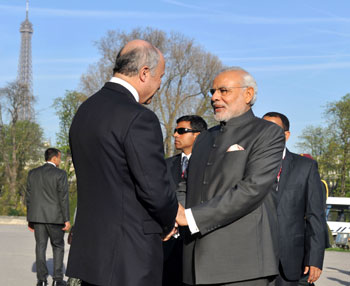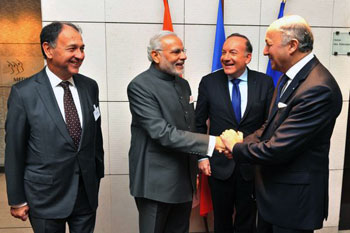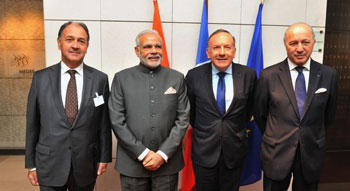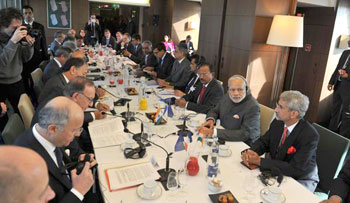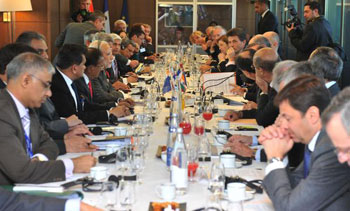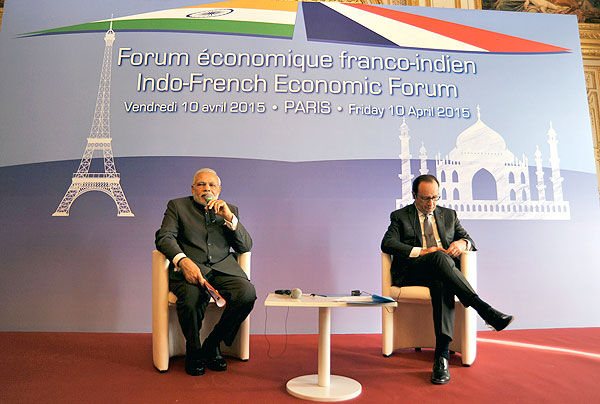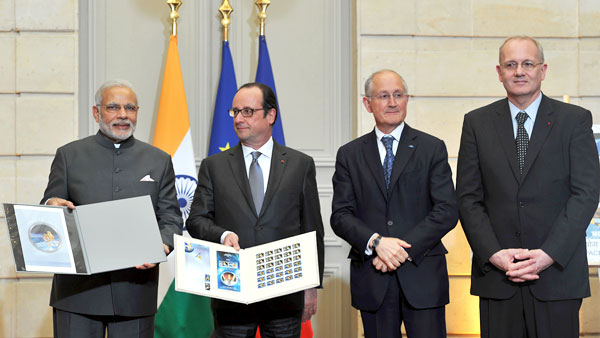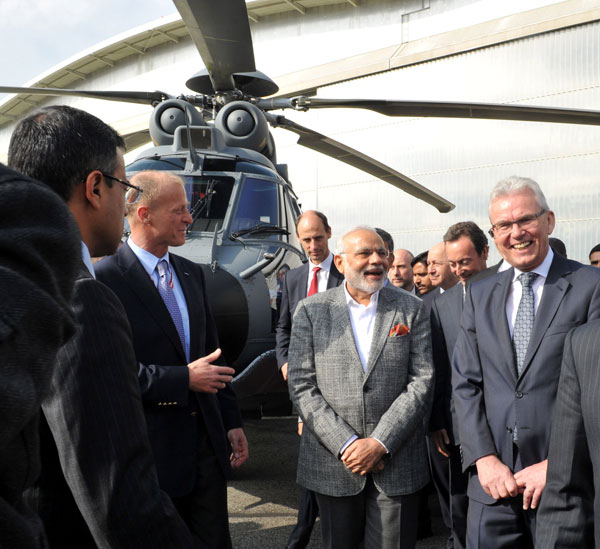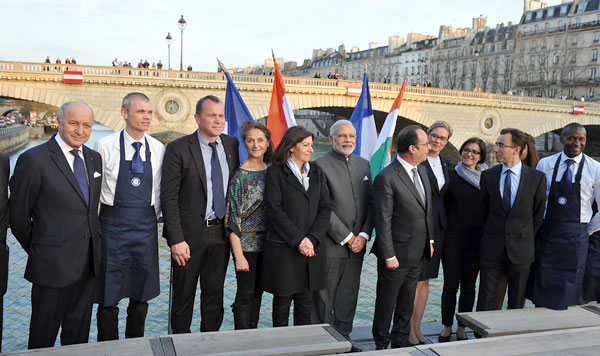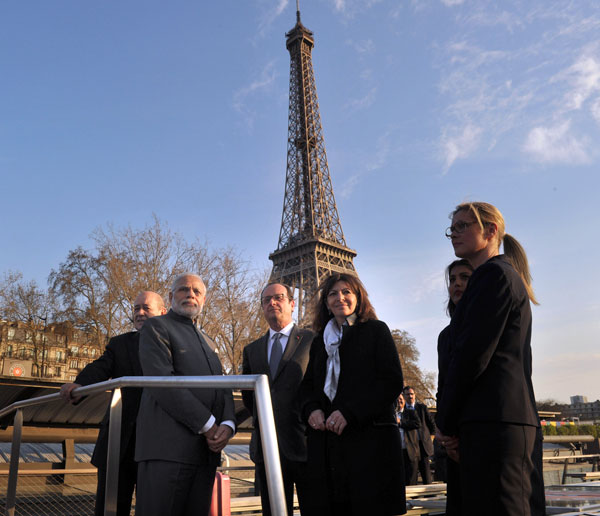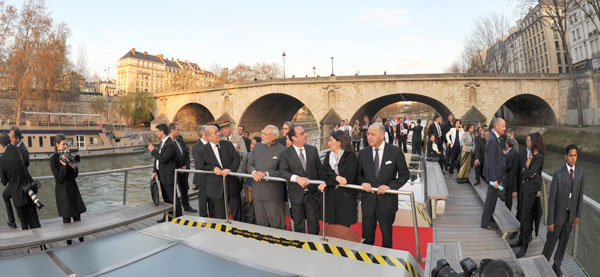INDIAN ARMED FORCES CHIEFS ON
OUR RELENTLESS AND FOCUSED PUBLISHING EFFORTS

SP Guide Publications puts forth a well compiled articulation of issues, pursuits and accomplishments of the Indian Army, over the years

I am confident that SP Guide Publications would continue to inform, inspire and influence.

My compliments to SP Guide Publications for informative and credible reportage on contemporary aerospace issues over the past six decades.
- Prime Minister witnesses 'Bharat Shakti' – a Tri-Services Firing and Manoeuvre Exercise in Pokhran, Rajasthan
- Interim Defence Budget 2024-25 — An Analysis
- Union Defence budget 2024
- Prime Minister Modi Commemorates Indian Navy Day in a Grand Ceremony
- Prime Minister Modi Flies in the LCA Tejas
- New Chapter in India-Italy Defence Ties
- Airpower beyond Boundaries
Indo-French Cooperation
The nation is optimistic that the diplomatic initiatives by Prime Minister Modi will open new vistas of opportunity for international cooperation not only with France but with other nations of the developed world.
 |
By Air Marshal B.K. Pandey (Retd) Former Air Officer Commanding-in-Chief of Training Command, IAF |
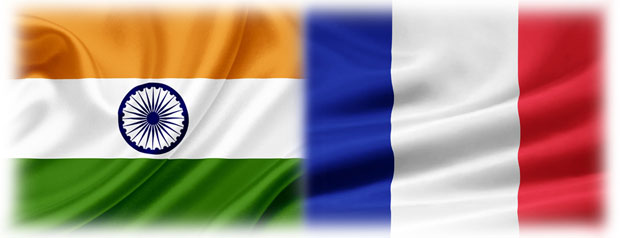
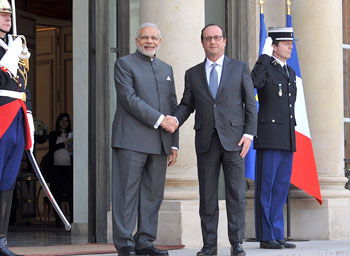
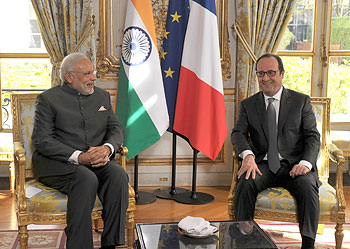
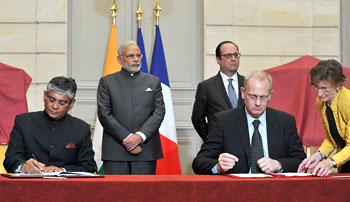
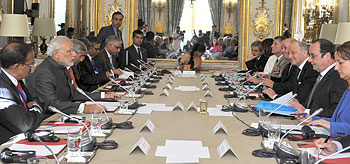
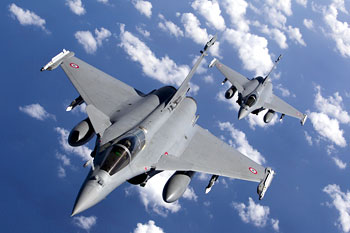
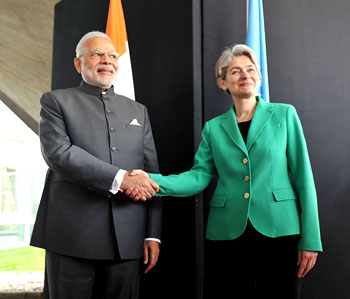
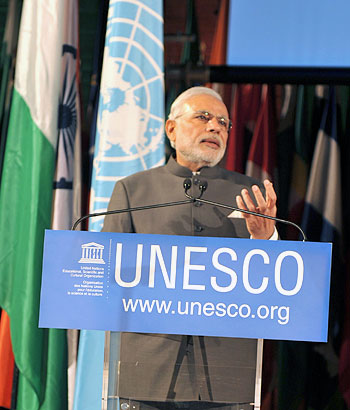
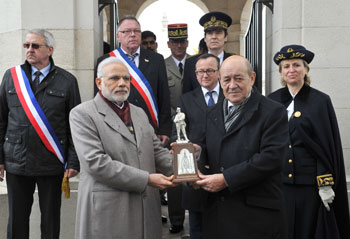
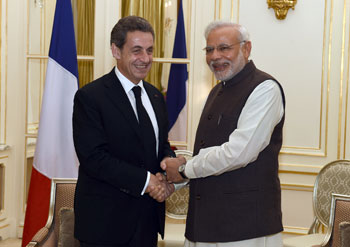
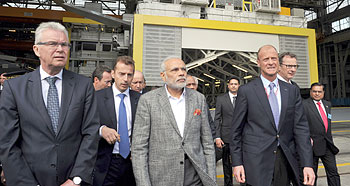
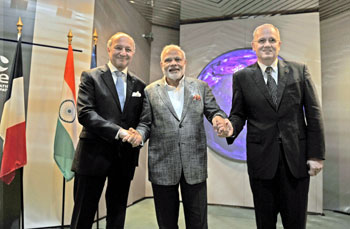
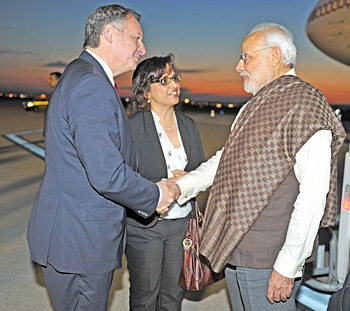
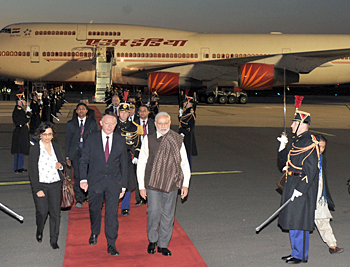
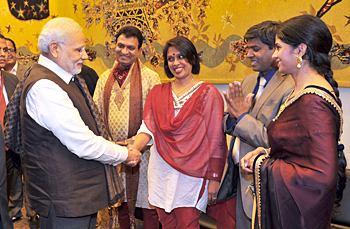
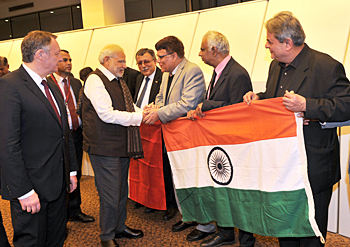
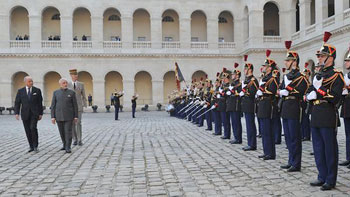
The relations between India and France have traditionally been close and friendly nurtured by regular interaction by the political leadership of the two nations. After the establishment of the strategic partnership in 1998, there has been significant forward movement in several facets of the relationship. This has been achieved through regular interaction between the functionaries at the top echelons of the government of the two nations. The areas covered during such interaction has included primarily those that are strategic in nature such as the regimes of defence, nuclear energy and space. The exchanges have however been focused largely on the commercial aspects. France has consistently supported India’s permanent membership of the United Nations Security Council as well as of the G-8.
Cooperation in the Regime of the Military
Procurement of military hardware from France in modern times commenced in 1949 beginning with some rudimentary equipment for the Indian infantry deployed at high altitudes in the Jammu and Kashmir region.
Despite positive vibes in the relations with France, India was somewhat dismayed at the sales of military hardware to Pakistan which included the Dassault Mirage III and Mirage V combat aircraft, the Breguet Atlantic long range maritime patrol aircraft, Excocet Missiles and Agosta Class submarines. The strain in the relationship on account of these sales which incidentally were driven totally by commercial interest, was partially subdued by the strong relations between India and France in the fields of civil nuclear energy and aerospace.
India has been purchasing military aircraft since the 1950s from France that has proved to be a dependable supplier.
During the war with Pakistan in 1965, France along with the US imposed an arms embargo on both India and Pakistan. However, France continued to supply spare parts for military equipment of French origin in the inventory of the Indian armed forces. While US and UK tightened sanctions against India after the war, France opted to lift the embargo in March 1966.
India has been purchasing military aircraft since the 1950s from France that has always proved to be a dependable supplier and virtually a reliable partner, not inclined to succumb easily to pressures from any quarter. Beginning in 1953 with the acquisition for the Indian Air Force (IAF) of Dassault Ouragan, a jet fighter aircraft of the first generation that was renamed as the Toofani in India, in 1956, the IAF received the Dassault Mystere IV that took part in the wars with Pakistan both in 1965 and 1971.
The Mystere IV was followed by the single engine Mirage 2000 fleet of multi-role aircraft once again from Dassault that was inducted beginning in the 1980s along with the Anglo-French Sepecat Jaguar Deep Penetration Strike Aircraft. The fleet of 49 Mirage 2000 aircraft that remain in service in the IAF are being upgraded with help from Dassault Aviation and with the new lease of life, are expected to continue in service with the IAF for at least another decade or more. France has also supplied the Indian armed forces with the Aerospatiale SA 315 B Lama and the Aerospatiale Alouette III, renamed in the IAF as Cheetah and Chetak respectively. The two types of single engine helicopters came in utility as well as in armed versions and were also manufactured under licence in India by the Indian aerospace major Hindustan Aeronautics Limited (HAL). France also supplied the Turbomeca TM 333 engine and jointly with HAL, developed the HAL/Turbomeca engine called the Shakti. This engine today powers the fleet of Advanced Light Helicopter Dhruv and its variants manufactured by HAL.
France had also supplied the carrier borne 12 Breguet Alize anti-submarine warfare aircraft for the Indian Navy. In addition, the French company DCNS has been contracted to supply six Scorpene submarines that are being built at Mazagon Docks Limited (MDL) in Mumbai under a Transfer of Technology arrangement. The first of these vessels was launched by the Minister of Defence, Manohar Parrikar, on April 06, 2015 and is currently undergoing sea trials. In 1956, the Indian Army procured 164 AMX-13/Model-51 light tanks which gave a good account of themselves in war..
But perhaps the most important deal so far with the French aerospace industry described as the “Mother of all Deals”, has been for 126 Rafale medium multi-role combat aircraft (MMRCA) once again offered by the reputed French aerospace major Dassault Aviation. Unlike the cases for procurement in the past of combat aircraft from France, the Rafale contract appears to have got bogged down in an inelegant stalemate wherein neither side is either willing nor appears to be in a position to climb down. It is now up to the wisdom of the enlightened political leadership on both sides to work out a mutually compatible solution. If the effort is not successful, it could seriously undermine the Indo-French relationship that has been forged so carefully over the last five and a half decades. But Prime Minister Narendra Modi is hopeful about the MMRCA deal as is evident from in his statement in an interview with the French newspaper Le Figaro ahead of the state visit when he said, "The question of the Rafale is still in discussion and we should be able to make progress on mutually acceptable basis".
However Prime Minister Modi sprung a pleasant surprise late evening on April 10, when while enunciating his part of the joint statement; he stated that the French President had accepted his request to provide 36 Rafale combat jets directly in fly-away condition. These 36 aircraft will be priced at Rs 700 crore each, the total cost being in the region of Rs 25,000 crore. This is a deal between the two governments and would in no way impinge on the ongoing contract negotiations for the 126 MMRCA. In fact this deal is beneficial in several ways. Firstly, it will provide the much needed shot in the arm for the combat fleet of the IAF which is dwindling rapidly. Secondly, the ease with which this deal has been concluded and made public, reflects the level of mutual confidence the leadership of the two nations enjoy. It not only adds a feather in their respective cap, it opens a new chapter in the long standing relationship between the two nations which bodes well for the pending “Mother of all Deals”. And finally, this deal could help break the deadlock in the contract negotiations with Dassault and pave the way for finalisation of the long awaited MMRCA contract, something that both the parties need badly and ought to be looking forward to.
Cooperation in the Field of Civil Nuclear Energy
France being one of the few nations that did not condemn the nuclear tests at Pokharan in 1998, was also the first country with which India entered into an agreement on nuclear energy following the waiver given by International Atomic Energy Agency and the Nuclear Suppliers’ Group enabling India to resume full civil nuclear cooperation with the international community.
A landmark Framework Agreement on Civil Nuclear Cooperation was signed between India and France on September 30, 2008 during the visit of the then Prime Minister Dr Manmohan Singh to France. This agreement paved the way for the sale of French-made nuclear reactors to India. Subsequently, during the visit to India by President Nicolas Sarkozy in December 2010, the General Framework Agreement and the Early Works Agreement between Nuclear Power Corporation of India limited ( NPCIL) and Areva, for implementation of EPR NPP Units at Jaitapur were signed. Areva is a French multinational group specialising in nuclear and renewable energy.
Today, France is one of the largest suppliers of nuclear fuel to India. However, the one issue that lingers in the domain of cooperation in the field of civil nuclear programmes is that of civil nuclear liability. The way forward in the search of a solution to this problem has already been demonstrated by Prime Minister Narendra Modi and the US President Barack Obama. Hopefully the leadership of both India and France will be able to resolve this issue without much difficulty.
Cooperation in the Regime of Space
India and France have been important partners in space technology and its applications. Indian Space Research Organisation (ISRO) and its French counterpart Centre National de Etudes Spatiales (CNES) have a history of cooperation and collaboration spanning about four decades.
In 1993, CNES and ISRO entered into an umbrella agreement for cooperation in the area of space exploration. Apart from joint missions such as Megha-Tropiques and SARAL that have been successfully developed, under a commercial Launch Service Agreement between Antrix Corporation Limited, the commercial arm of ISRO and ASTRIUM SAS, a company under EADS, France, two advanced Remote Sensing SPOT satellites were successfully launched in 2013 and 2014 on board ISRO’s most reliable workhorse, the Polar Satellite Launch Vehicle (PSLV). Arianespace based in France has been the major provider of launch services to Indian Geo-Stationary satellites. Subsequent to the launch of APPLE satellite, 18 Indian satellites have been launched by Arianespace. On December 07, 2014, GSAT 16 communication satellite was launched successfully onboard an Ariane 5 launcher from Kourou in French Guyana.
India's Vikas rocket engine, which powers both the PSLV and the Geo Stationary Launch Vehicle (GSLV), benefited from collaboration on the CNES Viking rocket engine of Ariane 4.
The Way Forward
There are a number of areas where the strategic interests of India and France converge. First is the cooperation in the regime of defence with India offering a lucrative market for the French aerospace and defence industry and readiness on the part of the French government to part with the latest technologies. Secondly, both India and France would like to see China’s growing influence contained as also would prefer independent foreign policy in the region, something described by Jean-Yves Le Drian, the French Defence Minister as “Strategic Autonomy”. Both the nations would like to ensure that the Indian Ocean is safe for maritime traffic that is vital for economic growth.
Having overwhelmed the countries in the Indian Ocean Region with his foreign policy initiative, Prime Minister Narendra Modi has now turned his attention to the developed world. The nation is optimistic that the diplomatic initiatives by Prime Minister Modi will open new vistas of opportunity for international cooperation not only with France but with other nations of the developed world.
